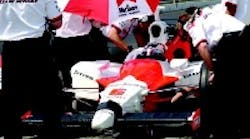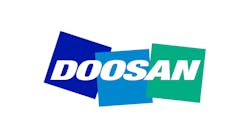A driver stops for service in practice. Team members immediately place a cover over the car's front wings — to maintain secrecy at Indy.
Wing adjusters (protruding from the car nose) are among the small aerodynamic parts Rayco produces for IRL teams.
An Indy car wheel is 100% magnesium and costs $1,700. The sensor between the spokes costs $4,000 and sends tire-pressure data back to the pits every 0.10 of a second.
Rayco builds suspension pickup points for IRL teams and understands the stresses these parts endure.
In pit stops, mechanics visually check every car for fatigued or failing parts and adjust the chassis setup.
Titanium IndyCar roll-bar blades. The part on the bottom was done on an EDM, taking over 3 hours to complete. A Hurco VM1 milled the other part in 30 minutes.
Rayco reconditions wheels by re-cutting the wheel-nut face and drive-pin surfaces of each rim to ensure wheels run true.
A titanium gear-shifter machined on Rayco's Hurco CNC cell, comprising a VM1 vertical machining center and a TM8 slant-bed turning center.
Front mainplate wing profile end-machined by Rayco.
Greg Cox split his company in two to better serve its customers. One section of the Indianapolis-based Rayco Machine Co. Inc. concentrates on production work, while the other manufactures racing-car-components. With this special strategy, Rayco easily juggles its mix of both large-run production and the small lots involved in making parts for race cars.
The company's racing side prides itself on quick turnaround and good service. As such, it keeps large inventories and relies heavily on a close-knit network of specialty shops, platers, material providers and local manufacturers.
While Rayco grew as a machine shop, Cox's love of racing kept him in pursuit of racing work through word-of-mouth and a proximity to the Indianapolis Motor Speedway and the headquarters of the Indy Racing League (IRL). The IRL is an American-based, open wheel, primarily oval-racing series, headlined by the Indianapolis 500.
Today the company has four motorsports professionals on staff with over 70 years of experience combined, including IndyCar, ChampCar, NASCAR, land-speed racing, and go-karts. Rayco's major racing customers include Dallara of Parma, Italy, one of two chassis providers for the IndyCar Series; Chip Ganassi Racing, which has a three-car IndyCar, a Grand Am sports car, a threecar NASCAR Nextel Cup, and a one-car NASCAR Busch Series team; and Fernandez Racing, Indianapolis, with a two-car IndyCar team. Automotive racing now accounts for about 60% of the jobs the shop runs.
Rayco turns and mills race-car components out of carbon fiber and solid bar-stock aluminum, titanium, steel and magnesium. The shop has 12 machines that date from 1984 to 2005, including a Hurco TM series lathe, which Hurco Companies Inc. of Indianapolis developed in conjunction with a Rayco CNC machine specialist. Cox says the racing side of the company predominately uses the newer lathes and mills because the older machines are slow, about 200 ipm as compared to today's 1,000 ipm.
The shop currently does not use turn/mill centers because if one goes down, it is as if two machines are out of commission. "But we are keeping an eye on using 5-axis machines in the future to make parts that are more advanced," says Cox. In addition, this year, the shop got into welding and fabrication work.
The shop considers any part on the car fair game. Among other items, Rayco makes parts for the electronics, components for wheel guns, titanium skid blocks, brake pedals and body and suspension mounts. "Weight is such an issue in racing. Very seldom do parts change that much, so some of our work is lightening-up existing parts, such as making gear walls thinner," explains Cox.
The shop also does final machining on and builds parts for front and rear uprights, which secure the car's suspension. Parts such as these involve a lot of work, from welding to machining to pressing in the bearings.
Rayco also reconditions wheels. "Teams have to have their wheels Zyglowed (crack checked) three times a year. Before they're checked, we re-cut the wheel-nut face and drive-pin surfaces of each rim to ensure wheels run true. At about $50 per wheel, that's not really a lot of money to bring a $1,700 wheel back to manufacturer specifications."
Rayco offers its racing customers more than just parts. "We advise the team engineers,"says Robert Perez, motorsports manager at Rayco, "They call and ask for our feedback for particular projects, and we point out areas to make processes easier. We typically provide the research, tell them what we think, and inform them of machine and material capabilities. Just because an engineer designs a part doesn't necessarily make it manufacturable or able to withstand the forces of racing."
Two in one
According to Cox, Rayco started as a turning shop that farmed out a lot of millwork for machine components and eventually purchased a pair of BMC 4020 mills from Hurco to make parts in-house. With these machines, Rayco began building parts for Allison Transmission, a division of General Motors that manufactures automatic transmissions for trucks, military transports and off-road vehicles.
Cox says he had to split the company into two entities once he dedicated certain machines to racing. "The Allison work is scheduled over several months, and we visit the GM website every morning to pull up a new schedule. With yearly contracts, we know the annual volume ahead-of-time. This security gives us the flexibility to run all the parts at once and then shelf them. Typically, these part runs are large — up to 80,000 pieces," he points out.
In contrast, on the racing side, parts from cars often arrive in the evening that must go out in time for the next day's race. "Many race teams have difficulty finding companies like us willing to jump through hoops for them, but our mindset puts us over the top. When it comes to race-car parts, we never say 'no'," beams Cox.
Thus, the race-shop schedule is like that of the race teams, with some work planned and some spontaneous. "A team might let me know it will need, for example, wing pillars in two weeks. I can then plan this job for an open machine," continues Cox.
But just as easily, the current situation can dictate what happens. Cox notes, "Scheduling, especially in May, is crazy. But we have to mold ourselves around the racing world. A team might be in trouble because their car crashed into a wall and needs parts fast — it might make the difference whether or not the team qualifies. When this happens, I quickly pull or move parts out of the schedules." However, the line is a bit blurry because sometimes the shop runs race jobs on machines normally running production. In fact, it defines production as the Allison jobs and any lots over 100 pieces.
Keeping large inventories
Because the racing scheduling is so crazy, Rayco keeps large inventories on certain items. One example is body mounts. There are 40 per car and 200 recently had been ordered off the shelf. Because it was Indy season, Rayco ran the parts even though it had yet to get the order.
The shop also buys a lot of extra material. For instance, it might need only 3 feet of material for a job, but it buys a whole stick, so the material will be on the shelf, ready to go. Chances are, if parts improve performance or the car crashes, the team will need more.
Cox adds, "For tooling, at any given time, I probably have $100,000 worth of inserts in stock at all times. There are certain end mills made especially for titanium, which have saved us a ton of money by speeding up our cycle times immensely. I make sure we always have four or five in stock."
In the loop
Because racing is a close-knit family, Rayco believes its network that includes race teams, engineers and specialty shops, suppliers, and a local machine manufacturer is a big advantage. The company subs-out a lot of EDM work, although this is changing. "We used to sub-out parts for wire EDMing that took 3 hours. We now mill them in-house, and the part takes 30 minutes on a Hurco VM1 mill," reports Cox.
The shop also subs-out anodizing and carbon fiber. "We have a great relationship with some of the local platers. For the regular, black anodize, I can make a phone call and have it the same day — just because it's racing parts," says Cox, "And we get carbon-fiber work turned around really quickly because we all work together. When a carbon-fiber supplier needs us to produce a 3D mold for them, we do it almost immediately, knowing they have hours of work still ahead to produce the part. Besides the molds and 3D work, we also do a lot of final machining and precision drilling of pieces like wings for the carbon-fiber manufacturers."
He adds it doesn't hurt having a machine manufacturer in your back yard. "We had a fan go out, which normally would have shut us down. But because Hurco is nearby, we got our fan and were back up and running within an hour."










